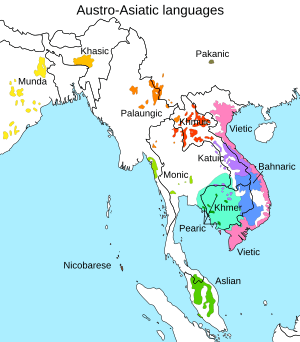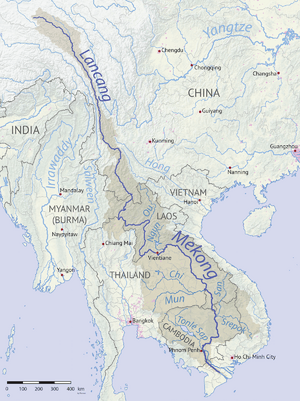Austroasiatic languages facts for kids
The Austroasiatic languages are a large family of languages. They are mainly spoken in Southeast Asia and parts of India. There are about 157 different Austroasiatic languages. Around 117 million people speak them. The two biggest languages in this family are Khmer language and Vietnamese. These languages are also official languages in the countries where they are spoken.
Contents
What are Austroasiatic Languages?
Austroasiatic languages form a group that linguists (people who study languages) believe share a common ancestor. This means they all developed from an older, single language. This idea helps us understand how languages are connected around the world.
Where are These Languages Spoken?
Most Austroasiatic languages are found in Southeast Asia. You can hear them in countries like Vietnam, Cambodia, Laos, Thailand, and Myanmar. Some are also spoken in parts of India, Bangladesh, and China. This wide spread shows how people and their languages have moved over time.
Major Austroasiatic Languages
Two languages stand out in the Austroasiatic family because they have many speakers and are official languages:
- Vietnamese: This is the national language of Vietnam. It has the most speakers in the Austroasiatic family. Vietnamese uses a writing system based on the Latin alphabet, which is different from many other languages in the region.
- Khmer: This is the official language of Cambodia. It is the second most spoken language in this family. Khmer has its own unique writing system, which is very old and beautiful.
Other important Austroasiatic languages include Mon, spoken in Myanmar and Thailand, and various Munda languages spoken in India.
How Did They Spread?
Scientists believe that the first Austroasiatic speakers lived in a specific area a long time ago. From there, their languages spread out. One idea is that they moved along important rivers, like the Mekong River. This helped them travel and settle in new places, taking their language with them. Over thousands of years, these languages changed and developed into the many different ones we hear today.
Images for kids
See also
 In Spanish: Lenguas austroasiáticas para niños
In Spanish: Lenguas austroasiáticas para niños
 | Kyle Baker |
 | Joseph Yoakum |
 | Laura Wheeler Waring |
 | Henry Ossawa Tanner |





